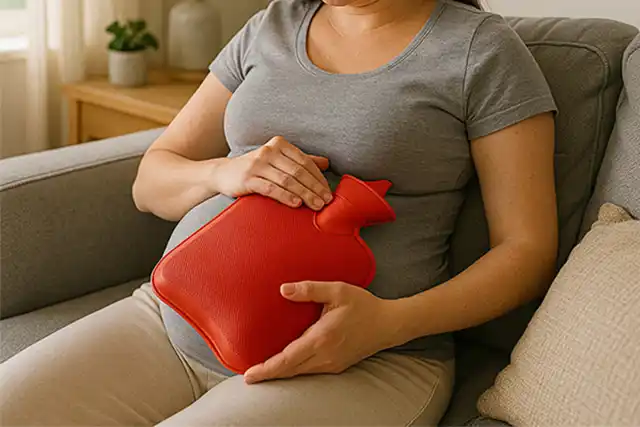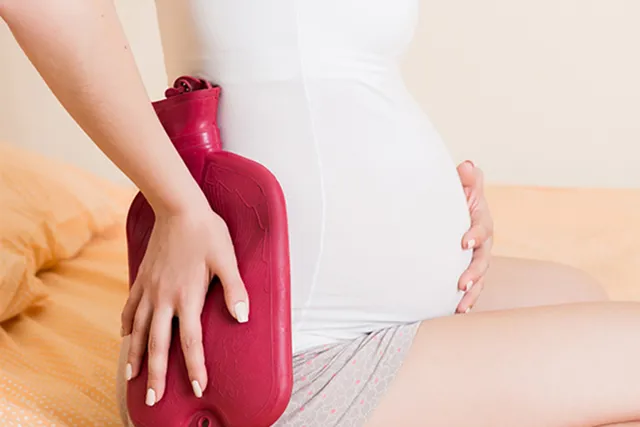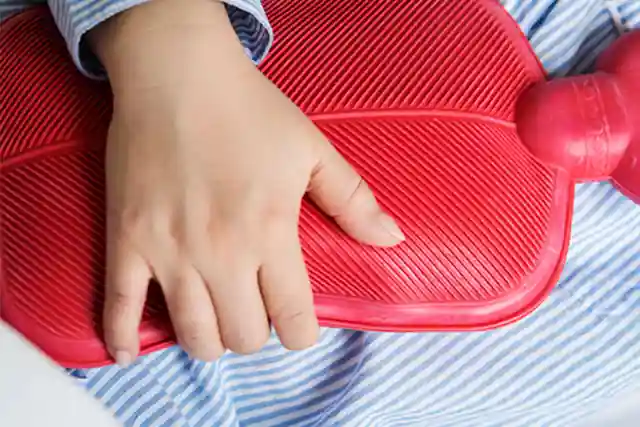Pregnancy is a life-changing phase or women, bringing joy and excitement but also major physical changes. Along with the joy of preparing to welcome a little angel, many pregnant women often suffer from muscle aches and pains as their bodies gradually adapt to the development of the baby.
Aches, joint discomfort, and cramps are common problems during pregnancy, causing many women to look for effective pain relief methods. A popular solution is to use hot packs to provide gentle warmth,relieve tension and neck pain.
However, the question is: Is it safe to use hot packs during pregnancy? In this detailed article, we will explore whether pregnant women can safely use hot packs, the benefits they provide, and the safeguardsneeded to ensure the safety of both mother and baby.
Can pregnant women use hot packs?
Understanding the Need of Pain Relief During Pregnancy
As the body undergoes many major changes during pregnancy, aches and pains can arise. Understanding the causes of these pains is essential to determining safe and effective pain relief methods.
1. Common Causes of Aches During Pregnancy
During pregnancy, women may experience many different types of pain, each stemming from different physiological changes:
Back Pain: One of the most common problems during pregnancy is lower back pain. As the baby grows, the mother's center of gravity gradually shifts forward, increasing pressure on the lumbar spine. Additionally, the increased weight during pregnancy also contributes to the pressure on the lower muscles, leading to discomfort, especially in the second and third trimesters.
Hip and Pelvic Pain: The hormone relaxin, which is released during pregnancy to prepare the pelvis for childbirth, helps the ligaments and pelvis become more flexible and stable. This increased flexibility can cause pain and discomfort in the hips and pelvis, especially as the pregnancy progresses.
Leg Cramps: Leg cramps, especially at night, are another common problem for pregnant women. These cramps are often caused by the extra weight of pregnancy, changes in blood circulation, and sometimes a deficiency in essential minerals such as calcium and magnesium.
Round Ligament Head: Supports the pelvis and will increase the expansion of the pelvis to accommodate the growing baby. This strain can cause sharp, sudden pain in the lower abdomen and groin, commonly known as sciatica.
Sciatica: As the uterus grows, it can press on the sciatic nerve, leading to sciatica—a sudden pain that radiates from the lower back down the leg. This can cause significant discomfort, especially in the later stages of pregnancy.
2. The role of heat therapy in treating aches
Heat therapy is a well-known method for relieving pain and muscle tension. By applying heat to the painful area, blood flow is improved, muscles are relaxed, and pain is relieved. Hot packs are a convenient and accessible heat therapy formula that provides effective pain relief for many different types of pain.
However, the use of hot packs during pregnancy should be done with caution to avoid potential risks associated with overheating.

Can pregnant women use hot packs?
Is it safe to use hot packs during pregnancy?
The main concern with using hot packs during pregnancy revolves around the risk of overheating, which can be dangerous for both mother and baby. Understanding the potential risks and how to use hot packs safely is important for pregnant women looking to relieve pain and discomfort.
1. Risks of overheating during pregnancy
Overheating during pregnancy can be very dangerous, especially in the first trimester. Elevated body temperature has been linked to an increased risk of neural tube defects and other developmental problems in the fetus. For this reason, pregnant women are often advised to avoid activities that can significantly increase body temperature, such as using hot tubs, saunas, or exercising vigorously in hot environments.
2. How to Use Hot Packs Safely
While the risk of overheating is a legitimate concern, hot packs can still be used safely during pregnancy if the following precautions are followed:
Use at Low Temperatures: To minimize the risk of overheating, always use hot packs at the lowest temperature. This ensures that the pack provides gentle warmth rather than intense heat, minimizing the risk of raising body temperature.
Time Limits: It is important to only use hot packs for short periods of time, usually no more than 15-20 minutes at a time. Prolonged exposure to high temperatures can increase the risk of overheating and should be avoided.
Avoid Direct Skin Contact: To reduce the risk of burns or exposure to excessive heat, place a thin towel or cloth between the hot pack and your skin. This creates a cushion that reduces the intensity of the heat and prevents discomfort or injury.
Monitor Body Temperature: Always pay attention to how your body feels when using a hot pack. If you start to feel too hot or uncomfortable, remove the pack immediately. Also stay hydrated and avoid using hot packs in a warm room.
Avoid Putting Hot Packs on Your Belly: It is not recommended to put hot packs directly on your belly during pregnancy, as this can increase the temperature around your baby. Instead, focus on safe areas such as your lower back, hips, or legs to relieve pain without affecting your baby.
3. Alternative Methods for Pain Relief During Pregnancy
For those who want to avoid using hot packs or are concerned about the risks, there are many alternative methods for pain relief during pregnancy:
Warm Baths: Taking a warm (but not hot) bath can help relax your muscles and relieve discomfort. Make sure the water temperature does not exceed 37.8°C to avoid raising your body temperature.
Prenatal Massage: A professional prenatal massage can significantly reduce muscle tension and stress. Be sure to choose a massage therapist trained in prenatal massage to ensure the techniques used are safe for pregnancy.
Stretching and Exercise: Gentle stretching exercises and prenatal yoga can help improve flexibility, reduce muscle stiffness, and relieve pain. Always consult your doctor before starting any new exercise program during pregnancy.
Cold Therapy: In some cases, cold therapy, such as the application of ice packs, may be more effective in reducing inflammation and pain, especially for acute injuries or swelling. Cold therapy can also be combined with heat therapy to create countervailing therapy, alternating between hot and cold to reduce pain and inflammation.

Can pregnant women use hot packs?
Benefits of Using Hot Packs During Pregnancy
When used properly, hot packs can provide many benefits for pregnant women, making them a useful tool for managing pregnancy-related discomforts.
1. Relieves Muscle Aches and Stress
Hot packs can provide targeted pain relief for muscle aches and tension, especially in the lower back and hips. The warmth helps relax tense muscles, reduce spasms, and ease discomfort, making it easier for pregnant women to carry out daily activities.
2. Improves Blood Circulation
Applying heat to specific areas of the body can improve blood circulation, especially during pregnancy. Improved blood circulation can help reduce swelling in the legs and feet, promote recovery in sore muscles, and deliver more oxygen and nutrients to tissues.
3. Reduce Stress and Anxiety
The gentle warmth of a hot pack can have a calming effect, helping to reduce stress and anxiety. Pregnancy can be an emotionally sensitive time, and stress management is important for the health of both mother and baby. The gentle warmth of a hot pack can provide comfort and relaxation, contributing to improved mood.
4. Non-Invasive and Convenient Pain Relief
One of the great advantages of using a hot pack is that it offers a non-invasive method of pain relief. Unlike medications, which can be risky during pregnancy, hot packs offer a non-pharmacological option for pain management.
In addition, hot packs are convenient and easy to use, making them a readily available solution for pregnant women when experiencing discomfort.
Precautions When Using Hot Packs During Pregnancy
To ensure that using hot packs during pregnancy is safe, there are certain precautions and guidelines that should be followed.
1. Consult Your Doctor
Before using a hot pack, consult your doctor or healthcare provider. They can provide personalized advice based on your medical history, your pregnancy, and any potential risks. Your doctor may also suggest alternative methods of pain relief if they feel that using a hot pack may not be appropriate for you.
2. Avoid Prolonged Use and High Temperatures
As mentioned earlier, it is important to limit the amount of time you use a hot pack and always use it at the lowest temperature. Avoid using hot packs for long periods of time or at high temperatures, as this can increase the risk of overheating.
3. Pay Attention to Where You Place Your Hot Pack
Never place a hot pack directly on your belly, as this can increase the temperature around your baby. Instead, focus on areas that are safe to apply heat, such as the lower back, hips, or legs.
4. Watch for Signs of Overheating
Watch for any signs of overheating, such as excessive sweating, dizziness, nausea, or feeling too hot. If you experience any of these symptoms, remove the hot pack immediately and cool your body. It is also important to stay hydrated and avoid using hot packs in an already hot environment.
Can pregnant women use hot packs?
When to Avoid Using Hot Packs
While hot packs can have many benefits, there are some situations during pregnancy when their use should be avoided.
1. High-Risk Pregnancy
Women with high-risk pregnancies—such as those with a history of premature birth, preeclampsia, or other complications—should avoid using hot packs unless advised by their doctor. In these cases, it is important to follow medical guidelines closely to ensure the safety of both mother and baby.
2. Abdominal Pain or Cramping
If you experience abdominal pain or cramping during pregnancy, it is important to consult your doctor rather than using hot packs. Abdominal pain can be a sign of a variety of conditions, some of which may require medical intervention.
3. High Body Temperature or Fever
If you have a fever or are already feeling too hot, avoid using a hot pack. Adding heat to your condition may make it worse and could be dangerous for your baby.
4. On Injured or Inflamed Areas
If you have a recent injury or an area that is inflamed, using a hot pack may not be recommended. Cold therapy may be a more appropriate option in these cases, as it can help reduce inflammation and numb the pain.
Conclusion
Hot packs can be a safe and effective way for pregnant women to relieve pain and discomfort, provided they are used carefully. By following the recommended guidelines, such as using low temperatures, limiting the duration of use, and avoiding direct contact with the skin, pregnant women can safely enjoy the benefits of heat therapy.
However, it is important to consult your doctor before using a hot pack, especially if you have any concerns or underlying health conditions. By taking these precautions, you can ensure your comfort while protecting the health of yourself and your baby throughout your pregnancy
